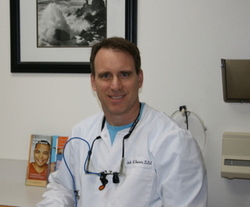A complete denture replaces all the natural teeth and provides support for cheeks and lips. It is for people who are missing all of their upper teeth and/or all of their lower teeth. Without this support, sagging facial muscles can make a person appear older. By replacing missing teeth, dentures improve a person’s ability to speak and to eat.
Complete dentures are called “conventional” or “immediate” according to when they are made and when they are inserted into the mouth. Conventional dentures are made and inserted after the remaining teeth are removed and the tissues have healed. Healing may take several months. Immediate dentures are inserted immediately after the removal of the remaining teeth. To make this possible, the dentist takes measurements and makes models of the patient’s jaws during a preliminary visit. An advantage of immediate dentures is that the wearer does not have to be without teeth during the healing period. However, bone and gums shrink over time, especially during the period of healing in the first six months after the removal of teeth. Immediate dentures will then require a reline of the interior of the dentures to fit properly much sooner than will the conventional dentures.
It does take several visits to construct a well fitting denture. Accurate impressions need to be made of your mouth, the relationship between your upper and lower jaws needs to be recorded, the denture needs to be patient approved and if possible tried in the mouth prior to final fabrication, and a few adjustments need to be made before you are wearing them comfortably. A healthy mouth will insure that your treatment will progress with the greatest possibility for success. Your mouth is unique and may require additional therapy to achieve oral health and make a firm foundation for your new denture prior to its fabrication.
Even with full dentures, you still need to take good care of your mouth. Clean your dentures and mouth of any food debris after every meal. Every night and morning, brush your gums, tongue and palate with a soft-bristled brush. Also, clean your denture every night. See your dentist at least yearly for an exam.
Dentures are only substitutes, at best, for your natural teeth, and cannot be compared directly with natural teeth. New dentures (even if you currently wear dentures) will feel awkward for a few weeks, and may take as long as six to eight weeks for your mouth to adjust to them. A denture is basically a foreign body made of acrylic trying to stay steady in an unfriendly environment. It just sits on the upper roof of the mouth and or gum ridges of the lower jaw where the teeth used to be, and the tongue and cheeks can easily push it around. The dentures will feel loose until the muscles of your cheek and tongue learn to keep them in place. A feeling of fullness, additional saliva, difficulties with speech, eating, and soreness are inevitable when you first wear new dentures. As your mouth becomes accustomed to the dentures, these problems should diminish. It will take a great deal of practice and patience on your part before you will master the use of the new dentures. Time, experience in their use, and help from your dentist will aid you in overcoming these problems.
The shape and contour of the ridges on which the dentures will sit, the amount and consistency of one’s saliva, and the way that each individual’s jaw moves during function influences the fit and retention of the dentures. Although millions of people happily and successfully wear dentures, overall, some 25% of patients are likely to be dissatisfied with their dentures. Many patients are quite satisfied with dentures that are extremely poor, while other patients are dissatisfied with dentures that seem to be technically excellent. It is usually impossible to predict which patients are likely to have problems.
An excellent way to make your denture more secure is to attach it to dental implants which are held into the mouth tightly by the bone. This type of appliance is called an implant retained overdenture. In some cases implants can replace all of your teeth without the need for a denture at all.

